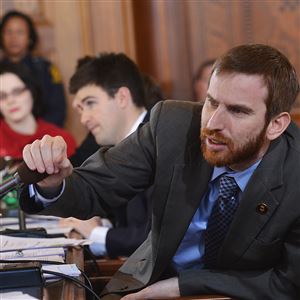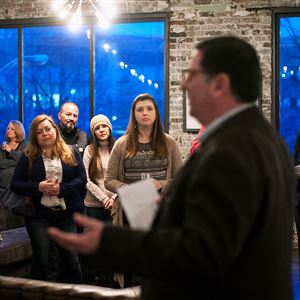On the heels of Martin Luther King Jr. Day, legislation bound for Pittsburgh City Council today would foster new safeguards for local immigrants, refugees and people with disabilities.
Six bills by Councilman Dan Gilman would ban the city from withholding public services based on a person’s immigration status, spur a “language access plan” and declare Pittsburgh a welcoming community, among other provisions.
While the city has honored diversity for generations, Mr. Gilman said, such formal action would let Pittsburgh take an official stand on inclusiveness. He said he worked a few months on the legislation, which he shared with the Pittsburgh Post-Gazette before its scheduled introduction this morning at the City-County Building, Downtown.
“Certainly, the current political climate and public dialogue triggered more of a call for action. But this is not something that is in response purely to any election or federal action,” Mr. Gilman said. “It’s a recognition that it’s time to very publicly state what Pittsburgh has stood for for a very long time.”
In particular, he lamented public rhetoric in recent years that “has left a lot of community members fearful.” Much of his legislation echoes Allegheny County and city goals on immigration and diversity, including the Welcoming Pittsburgh plan that Mayor Bill Peduto introduced in June 2015.
Mr. Peduto has sought to grow the city population by 20,000 during the next decade or so. More than 82,000 immigrant residents live in the 10-county Pittsburgh region, with the foreign-born population having increased nearly 8 percent from 2009 to 2014, according to the Partnership for a New American Economy. The overall regional population was stagnant.
“When you talk to businesses and you hear what they’re looking for, they’re looking for a community that is understanding and supportive of all people,” Mr. Peduto said. His administration supports Mr. Gilman’s effort, which the mayor said has involved the labor, faith-based, nonprofit, foundation and corporate communities.
“It will allow Pittsburgh to be with cities across this country that recognize the value of every individual is the responsibility of all government,” Mr. Peduto said.
Among their specifics, Mr. Gilman’s bills would:
• Prevent the city from contracting with companies recently convicted of wage theft. Immigrants and refugees are often victims of such theft, Mr. Gilman said. “We want to be doing business with companies that are treating their workers legally and ethically.”
• Call on the city police chief to create an Office of Multicultural Affairs. The office would build relationships to “better serve and protect Pittsburgh’s immigrant and refugee population,” according to the legislation.
• Call for a communications and “language access” plan. The idea is to make city services easier to use for people with disabilities and those who are learning English, Mr. Gilman said.
• Call on Pittsburghers to welcome all visitors, residents, workers and students. The measure would “affirm Pittsburgh’s status as a welcoming city.”
• Urge the federal government to uphold the Deferred Action for Childhood Arrivals initiative. Under the policy, eligible young people who arrived in the U.S. as children may apply to avoid deportation, at least temporarily.
• Ensure that city benefits, services and opportunities won’t hinge on a person’s citizenship or immigration status — unless a court order says otherwise. Mr. Gilman called this a pre-emptive proposal, saying he knows of no such discrimination in Pittsburgh city government.
Mr. Gilman, a Democrat, did not place the legislation under a “sanctuary city” banner. The controversial designation typically refers to municipalities that do not cooperate in full with federal Immigration and Customs Enforcement, according to the Marshall Project nonprofit in New York.
Although Pittsburgh rules keep city police from detaining people based solely on claims about immigration status, the policy says that police should cooperate with ICE to help detain people who are subject to criminal investigations.
At the Republican Committee of Allegheny County, vice chairman David Majernik cast many of Mr. Gilman’s proposals as “feel-good measures.” He said he was speaking only for himself, not the local GOP.
“I just think their time and energy could be spent better trying to make the city a more livable place. I guess that’s what they think they’re doing,” Mr. Majernik said of City Council. “To me, a livable place is where you can be safe from crime and drugs and get a job and things like that. To me, that makes the city livable and welcoming.”
Adam Smeltz: 412-263-2625, asmeltz@post-gazette.com, @asmeltz.
First Published: January 17, 2017, 5:00 a.m.


















